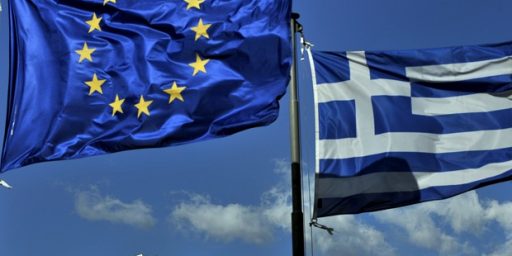Greece Likely To Face New Elections
It looks like Greece is headed for another round of Parliamentary elections after all the major parties failed to form a workable coalition government:
ATHENS — Just three days after elections in Greece left a fractured political landscape, and raised further doubts about its commitment to a foreign bailout and its future in the euro zone, the country looked set on Wednesday for a second round of polls as party leaders appeared unable to form a government.
Alexis Tsipras, the leader of a leftist party that made unexpectedly large gains in Sunday’s elections, was to meet on Wednesday afternoon with the heads of the two parties that favor the foreign bailout, Antonis Samaras of conservative New Democracy, whose coalition lost its majority in the polls, and the chief of the socialist party Pasok, Evangelos Venizelos. But the chances of the political rivals finding any common ground seemed to be minimal, making it likely that new elections will be called for mid-June.
Mr. Tsipras, in a speech to labor union members on Wednesday, said his aim was to “put a stop to the financial barbarism we have experienced in recent years.” He and his party, the Coalition of the Radical Left, known as Syriza, have demanded that the outgoing leaders renege on their commitments to a $170 billion loan deal signed in February with Greece’s foreign creditors, known as the troika — the European Commission, European Central Bank and International Monetary Fund — as the basis for the formation of a new government that would revoke austerity measures, like wage and pension cuts, and impose a moratorium on Greece’s debt repayments.
Mr. Tsipras was to send letters to the leaders of the troika by Wednesday afternoon, his office said, asserting that the commitments of the outgoing government to the bailout deal are null and void after the outcome of the Greek elections. His office also confirmed that Mr. Tsipras has written to the French president-elect, François Hollande, requesting a meeting.
The proposal by Mr. Tsipras, 38, rattled European Union leaders and global markets, while Greek banks declined by more than 20 percent on Tuesday following proposals by two Syriza members of parliament, Dimitris Stratoulis and Manolis Glezos, that private bank deposits could be accessed by a leftist government. Mr. Glezos, a veteran leftist, said deposits in excess of $25,800 could be used to pay state wages and pensions, and Mr. Stratoulis suggested that the funds would be used “for growth and a productive restructuring of our country.” Syriza’s headquarters were quick to clarify that deposits would not be seized by banks but used to support the real economy “as is done by banks over the world.”
Mr. Tsipras’s call on the outgoing coalition leaders to revoke their signatures on Greece’s debt deal was rejected on Tuesday by Mr. Samaras, the conservative leader who accused his political rival of putting Greece’s future in the euro in jeopardy. Mr. Samaras, whose party was the front-runner in the elections, got the first shot on Monday at forming a government but gave up within hours.
Mr. Venizelos, the socialist leader, struck a more conciliatory tone ahead of talks with Mr. Tsipras, noting that Pasok’s only precondition was to secure Greece’s position in the euro zone. But it remained unclear to what extent Mr. Venizelos, former finance minister who negotiated Greece’s debt deal with creditors, would be prepared to compromise his pro-bailout position in talks on Wednesday.
Mr. Tsipras was also due to meet Wednesday with the leader of another anti-austerity party, Independent Greeks, but the 33 seats garnered by that party, led by Panos Kammenos, in addition to Syriza’s 52, would leave the bloc far short of a majority in Greece’s 300-seat Parliament. Mr. Tsipras could also count on the 19 seats gained by Fotis Kouvelis, the leader of Democratic Left, who has backed Syriza, but without the backing of the intractable Communist Party, the leftist coalition he seeks appears unattainable.
If Mr. Tsipras fails to form a government by Thursday evening, when his three-day mandate expires, the baton would pass to Mr. Venizelos, whose once mighty socialist party came in third in the polls. Mr. Venizelos called on Tuesday for “a national unity government consisting of all forces wanting Greece in Europe and in the euro.” But his prospects for forming a new coalition with rival conservatives and a party opposed to the bailout are also slim. His appeal prompted a counterproposal on Wednesday by Mr. Samaras who appealed to center-right parties to join forces on a pro-European platform.
The likeliest scenario is for President Karolos Papoulias to appoint an interim government and call new elections within 30 days, a further destabilizing move as Greece faces a series of crucial deadlines.
The biggest danger, of course, is that another round of elections leaves the extremist parties on the left and the right with even more power.




Looks like the European Financial Stability Facility decided to reward Greece for voting for wackos of the far left and far right, by giving them more money. This will end well, I’m sure.
@John Thacker:
Since the wackos haven’t yet violated the terms of the bailout agreement, there is no basis for withholding the money at present.
The Euro was always a really bad idea and now it’s toast. The sooner the better. It will be painful but it will be more painful later than now. It was never anything but an attempt to create an economic Third Reich. The voters in Europe have figured this out.
The Eurozone is the Titanic and it’s hit the iceberg.
how long did Belgium go without a government? Could be answer for Greece.